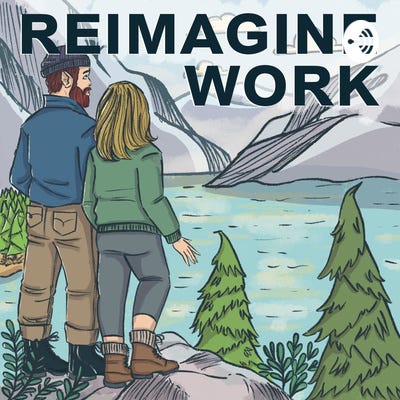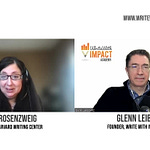Paul Millerd is an experiment in self-reinvention, and he’s documenting his life, his ideas, and how he works if you care to read, listen, or watch.
If you’re looking for a professional title that tells you everything you need to know about his role at work and his place in the world, you’ll need to do a bit more digging. At the top of his LinkedIn profile he describes himself as a ‘curious human and solopreneur.’
Instead of looking for a fancy title at a name-brand company (he spent nearly a decade working at several such firms after picking up his MBA from MIT), look at what he actually does.
He writes a lot, with nearly 85,000 subscribers to his ‘Reimagine Work’ newsletter on LinkedIn, and a rapidly growing list of several thousand subscribers to ‘Boundless,’ his newsletter on Substack.
He interviews solopreneurs and creators like himself from around the world on his podcast, ‘Reimagine Work.’
He’s a course creator, crafting practical step-by-step guides for freelancers trying to figure out how to turn their skills and passions into sustainable businesses.
And he’s writing his first book.
Since ditching the corporate world and quitting the 9-to-5, Paul has hung up his suit and tie in favor of t-shirts and jeans. He finally gets to do what he loves and live the life he really wants.
In addition to choosing what he works on, and how much time he devotes to each project, he also chooses where he works, tapping out his latest newsletter, or recording a new podcast episode, while overlooking the Pacific Ocean along Taiwan’s gorgeous eastern coastline.
I met Paul a couple of years ago in busy, bustling Taipei, just as he was settling into his self-fashioned working life, and before he moved east to enjoy the quieter and greener surroundings of the mountains hugging Taiwan’s scenic coast.
And so, after following his writing for some time now, I invited him to join me for a conversation for one of my new Writing Masterclasses. I asked him about his writing process, a topic that I’m perpetually curious about.
Paul is a voracious reader, a deep thinker, and he chooses his words with care and precision.
Below are a few short clips, as well as the complete video conversation, which I’m making available to all of my free subscribers at the bottom of this post (the full podcast conversation is at the top of this post).
Thank you for subscribing to Write With Impact Academy! If you’d like more great content like this, consider becoming a paying subscriber. I’m running a special series on writing your first book in August that you’ll get complete access to (plus tons of other content about writing) once you’re a full member.
Sensemaking of ideas
The fundamental skill is sensemaking of ideas, and communicating simply, persuasively, and in a way that actually makes sense and enables other people to take action or do something.
It’s really this meta process of thinking about your thinking. It’s starting with this idea that you don’t actually know what you think. And that is really hard for people. A lot of people want to write because they want to just tell people what they think. As a writer, if you’re going to take it seriously, it’s a little dangerous, right? Because the ideas might take you to blow up beliefs you hold dearly.
I am very humble and hold my ideas very lightly in terms of how I think about exploring ideas, writing, and sharing them.
Watch this short clip of Paul talking about how he figures things out through writing:
Wandering into the unknown
I love wandering into the unknown, both in my life and in my writing. The delight of stumbling upon something you’ve just written that surprised you is so cool.
I think I was writing about this period where I just didn’t work for a very extended period, and I was trying to make sense of that. And I think what I realized is — I was in Asia at the time — I didn’t have this script playing in my head, because I didn’t know what other people thought of me.
If I did the same thing in Boston or New York, I’d know what people would be thinking, about what is the right way to live, what a good person does, what they think about work, how they might be judging me. Whereas in Asia, I realized when I was writing this, that script in my head evaporated. I wrote something like that, and I was like, “Wow, I never thought about that before.”
And that then gives me language to talk about something. So people will ask me, “How are your ideas so interesting or persuasive when you talk verbally?” It’s really just the product of writing about it and trying to figure out what I actually think.
Watch this short clip of Paul on how his writing feeds into his conversations with people:
A simple storytelling structure
There’s probably something human about storytelling that just lights up our brain. And we’ve been doing it forever. I think there are formulas to do that. You follow what Pixar does, or movies, or famous authors, the “Hero’s journey,” different mental models for thinking about this. And you can backwards out that kind of story that will excite someone.
But the way I think about story is even simpler than that. It’s really just connecting ideas in a way that flows with a reader. A reader says, I want to keep going on what I’m reading.
A story can be connecting three facts in an interesting way. It doesn’t have to be a mythical story about a journey to an outer world, etc. So there’s different kinds of stories, right? I’m talking about storytelling at the very simple level of trying to connect ideas in a way that makes sense.
Storytelling in the higher level is this aspirational aim of telling transformational stories. The Bible, all the religious texts, those are stories that have lasted, stood the test of time. There must be an element to them that resonates and why. There are some movies that last and we can’t really explain it. Those are stories, but you can’t just aim at that. There’s some sort of magic that goes into that as well.
Watch this short clip of Paul talking about a simple storytelling structure:
The imperative to create
Once you realize you can just get the words out and you need to just sit down and do it, keep going. But that voice that’s telling you that you want to create is never going to go away. And I think most of us have it. And I think it’s imperative on all of us to make sure we don’t kill off those voices, and fight for it, and keep that creative energy within us alive.
A few final words of inspiration to all of you writers out there:
Watch the complete conversation with Paul Millerd below, available to my free subscribers.
Thank you for subscribing! There’s tons more valuable content for paying subscribers, so give it a try for 14 days, entirely for free:

















Share this post